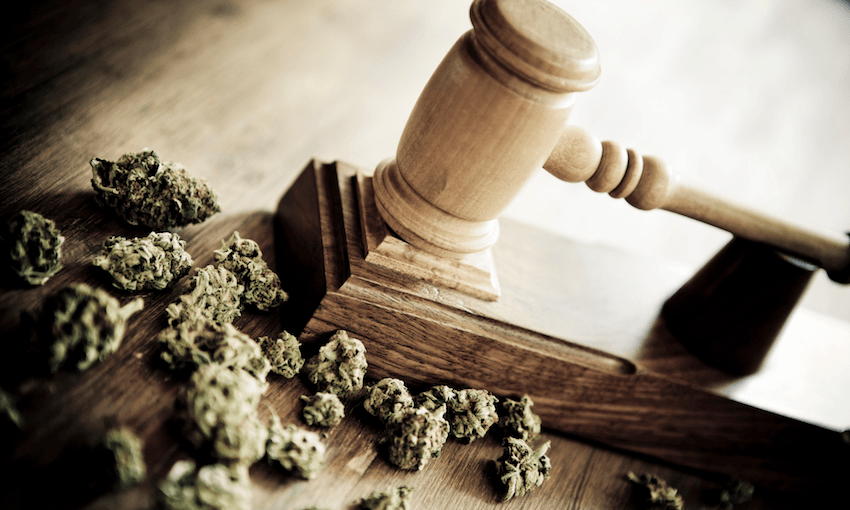One of the big challenges to the decriminalisation of cannabis is that no-one really knows what it means. Kathy Errington of the Helen Clark Foundation explains what a decriminalised system could look like in New Zealand.
Last year’s referendum was about legalisation, which would have seen adult cannabis use and possession made fully legal, regulated, and taxed. New Zealanders voted narrowly against this. Decriminalisation, on the other hand, sees cannabis use and possession remain illegal, but removes criminal penalties.
As consensus builds that this option will work best for New Zealand, the question comes up as to how best to approach a decriminalised system? How are we going to keep something illegal while ensuring far fewer people are criminalised for it?
The core problem that we need to solve is the unequal burden on the young, and on Māori, of criminalisation. Māori remain about 40% of those charged with cannabis offenses. The misuse of drugs amendment in 2019 tried to improve matters, but for Māori nothing has changed at all – the ratio has remained the same – and the impact on decreasing prosecutions overall has been lacklustre. An approach relying on police discretion has failed, and will continue to do so – after all, why shouldn’t police try to enforce the law as written? Cannabis possession and use is still illegal, and policing approaches reflect this fact.
Police discretion is pushed to breaking point when the public simply no longer supports enforcement of the law, which is where we have come to as a country on this issue.
So long as we remain clear on what the problem is we are trying to solve, we should be able to design a sensible system that avoids the commercial market which was narrowly rejected by voters in the 2020 referendum.
One sticking point though is how does decriminalisation deal with supply? Do we stick our heads in the sand and pretend cannabis comes from nowhere? Thankfully, that is not the only option.
A commercial market is not the only way to “non-criminally” supply cannabis – it can be grown at home. A decriminalised system that includes limited home growing would make a significant impact on how many people are dragged through the courts.
A working model of decriminalisation can be found across the Tasman, in ACT. Key features of the ACT model are that it decriminalises limited home growing of two plants per person or four per household, possession of up to 50 grams of dried cannabis or up to 150 grams of fresh cannabis, and allows cannabis use in your home.
It remains an offence to smoke or use cannabis in a public place, to expose a child or young person to cannabis smoke, and to store cannabis where children can reach it. It is also an offence to drive with cannabis in your system, to sell cannabis to anyone, and for people aged under 18 to grow, possess, or use cannabis.
It is not perfect, but in drug law reform there is no perfect world, just a better world. An Aotearoa where fewer young Māori men and indeed fewer people of any age and background see their potential damaged by a cannabis conviction will be a better country.
A proposal along these lines could be acceptable to a significant majority of New Zealanders, including a majority of supporters from every political party.
It isn’t good enough to say that we have had a referendum already on this issue and put the cannabis issue away – we only voted on a specific proposal for a fully legal and regulated commercial market. Our research shows that reform of some kind (either decriminalisation or legalisation) has a large majority of support, and has had for years.
When 70% of the country supports changing something, inaction will lead to cynicism. It is time for politicians to come to the party, and strike a bipartisan consensus about how to move forward. Seeing the deputy leader of National, Dr Shane Reti coming forward in favor of this sort of approach is a significant moment. It is fitting that the most senior Māori MP in the National Party is open to considering how to forge a consensus which most people can accept.
While justice minister Kris Faafoi is clear that cannabis decriminalisation is not a proposal the government will prioritise, his comments have also indicated that a private members bill may have a real chance of passage as a conscience vote. His concern for the injustice of the status quo is genuine. There are MPs across the political parties who understand this issue and want to see something done.
This is a relief because every day that goes by with another low-level conviction for cannabis creates a justified anger among those affected. How would you feel if you went to prison for something the PM herself has confessed on TV to doing? And something that probably many other politicians in NZ have done at some point? There are people, still, in that position in New Zealand. It has to stop.
